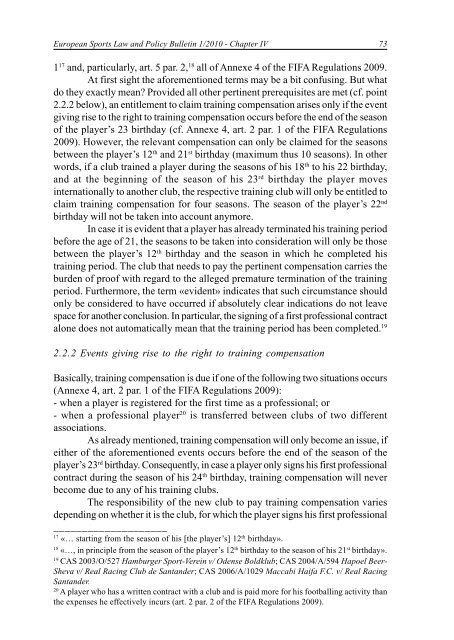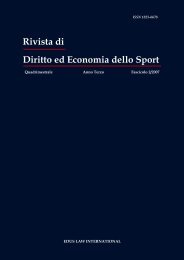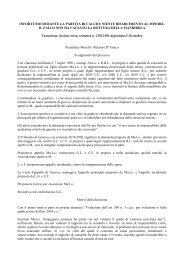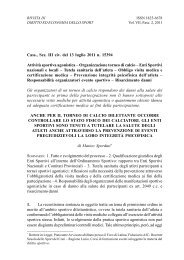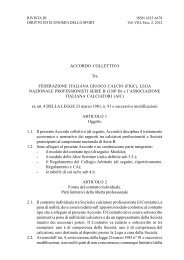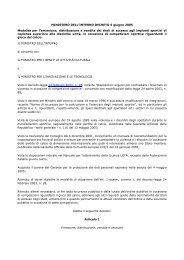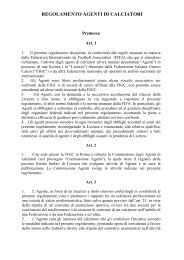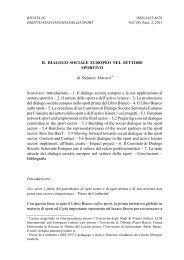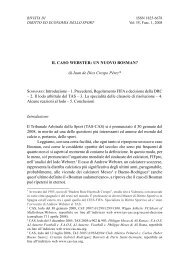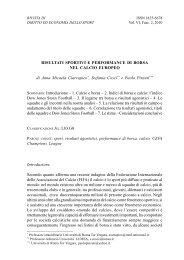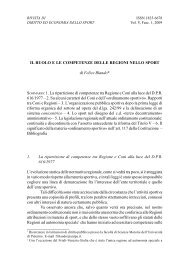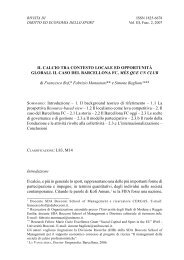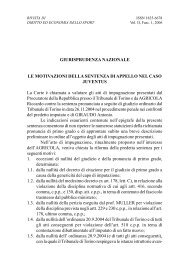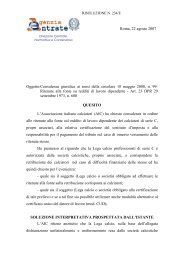European Sports Law and Policy Bulletin THE BERNARD ... - Slpc.eu
European Sports Law and Policy Bulletin THE BERNARD ... - Slpc.eu
European Sports Law and Policy Bulletin THE BERNARD ... - Slpc.eu
Create successful ePaper yourself
Turn your PDF publications into a flip-book with our unique Google optimized e-Paper software.
<strong>European</strong> <strong>Sports</strong> <strong>Law</strong> <strong>and</strong> <strong>Policy</strong> <strong>Bulletin</strong> 1/2010 - Chapter IV 731 17 <strong>and</strong>, particularly, art. 5 par. 2, 18 all of Annexe 4 of the FIFA Regulations 2009.At first sight the aforementioned terms may be a bit confusing. But whatdo they exactly mean? Provided all other pertinent prerequisites are met (cf. point2.2.2 below), an entitlement to claim training compensation arises only if the eventgiving rise to the right to training compensation occurs before the end of the seasonof the player’s 23 birthday (cf. Annexe 4, art. 2 par. 1 of the FIFA Regulations2009). However, the relevant compensation can only be claimed for the seasonsbetween the player’s 12 th <strong>and</strong> 21 st birthday (maximum thus 10 seasons). In otherwords, if a club trained a player during the seasons of his 18 th to his 22 birthday,<strong>and</strong> at the beginning of the season of his 23 rd birthday the player movesinternationally to another club, the respective training club will only be entitled toclaim training compensation for four seasons. The season of the player’s 22 ndbirthday will not be taken into account anymore.In case it is evident that a player has already terminated his training periodbefore the age of 21, the seasons to be taken into consideration will only be thosebetween the player’s 12 th birthday <strong>and</strong> the season in which he completed histraining period. The club that needs to pay the pertinent compensation carries theburden of proof with regard to the alleged premature termination of the trainingperiod. Furthermore, the term «evident» indicates that such circumstance shouldonly be considered to have occurred if absolutely clear indications do not leavespace for another conclusion. In particular, the signing of a first professional contractalone does not automatically mean that the training period has been completed. 192.2.2 Events giving rise to the right to training compensationBasically, training compensation is due if one of the following two situations occurs(Annexe 4, art. 2 par. 1 of the FIFA Regulations 2009):- when a player is registered for the first time as a professional; or- when a professional player 20 is transferred between clubs of two differentassociations.As already mentioned, training compensation will only become an issue, ifeither of the aforementioned events occurs before the end of the season of theplayer’s 23 rd birthday. Consequently, in case a player only signs his first professionalcontract during the season of his 24 th birthday, training compensation will neverbecome due to any of his training clubs.The responsibility of the new club to pay training compensation variesdepending on whether it is the club, for which the player signs his first professional____________________17«… starting from the season of his [the player’s] 12 th birthday».18«…, in principle from the season of the player’s 12 th birthday to the season of his 21 st birthday».19CAS 2003/O/527 Hamburger Sport-Verein v/ Odense Boldklub; CAS 2004/A/594 Hapoel Beer-Sheva v/ Real Racing Club de Sant<strong>and</strong>er; CAS 2006/A/1029 Maccabi Haifa F.C. v/ Real RacingSant<strong>and</strong>er.20A player who has a written contract with a club <strong>and</strong> is paid more for his footballing activity thanthe expenses he effectively incurs (art. 2 par. 2 of the FIFA Regulations 2009).


